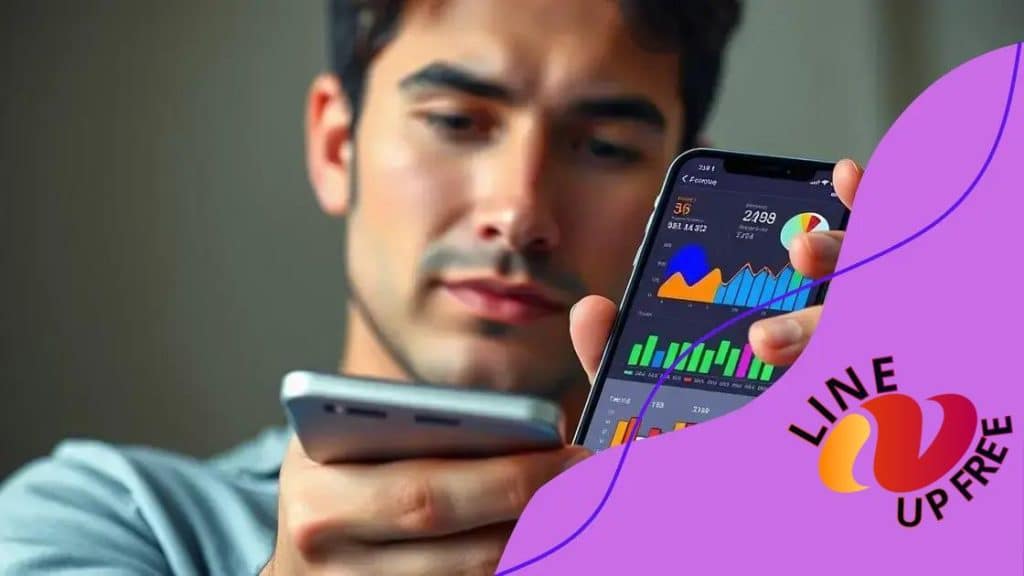The role of mobile apps in personal finance education

Anúncios
Mobile apps play a crucial role in personal finance education by providing tools for budgeting, expense tracking, and savings, helping users effectively manage their finances.
The role of mobile apps in personal finance education is more significant than ever. Have you ever wondered how these tools can enhance your money management skills? Let’s dive into their benefits and explore their impact.
Anúncios
Understanding mobile apps for personal finance
Understanding mobile apps for personal finance is crucial for individuals looking to gain better control over their finances. These applications provide an accessible way to track spending, create budgets, and save for future goals. Whether you’re a student or a professional, anyone can benefit from using these tools.
What are personal finance apps?
Personal finance apps are software applications that help users manage their financial activities. They offer features such as expense tracking, investment management, and savings goals. Many of these apps sync with your bank accounts, allowing for real-time monitoring of your finances.
Key features to look for
When selecting a finance app, consider evaluating its core features:
Anúncios
- Budgeting tools: Help you allocate funds and manage expenses.
- Automated syncing: Connects with your bank to update your finances seamlessly.
- Goal setting: Allows you to create savings goals and track your progress.
Moreover, some finance apps include educational resources, making it easier for users to learn about personal finance while managing their money effectively. This educational aspect can lead to greater financial literacy among users.
Many individuals are unaware of how technology can facilitate their understanding of finance. By providing intuitive interfaces and comprehensive analytics, mobile finance apps promote informed decision-making. Users can visualize their spending patterns and make adjustments that align with their financial goals.
Popular options available
With so many apps on the market, it’s beneficial to research and find one that suits your needs. Popular options include:
- Mint: Great for budgeting and expense tracking.
- YNAB (You Need A Budget): Focuses on proactive budgeting.
- PocketGuard: Simplifies expense tracking and budgeting.
Regardless of which app you choose, the important aspect is how it fits into your lifestyle. This adaptability can make managing personal finance easier and more effective.
Overall, embracing mobile apps for personal finance not only simplifies money management but also enhances your financial education. As you explore these platforms, you’ll find that they can serve as valuable companions on your journey to financial wellness.
Key features of effective finance apps
Key features of effective finance apps make them indispensable tools for managing your money. These features enhance the user experience and provide practical utilities that aid in financial planning and tracking.
User-friendly interface
A user-friendly interface is essential. When apps are easy to navigate, users can quickly access features without confusion. A clear menu and straightforward design ensure that anyone, regardless of their tech skills, can manage their finances effectively.
Expense tracking
Another critical feature is expense tracking. By allowing users to categorize their spending, finance apps help identify where most of the money goes. This awareness is crucial for controlling spending habits. Consider these elements in expense tracking:
- Automatic categorization: Transactions are sorted automatically into predefined categories.
- Real-time updates: Users see their spending patterns as they happen.
- Cost-saving suggestions: Apps may suggest ways to cut unnecessary costs based on spending habits.
This type of visibility empowers users to make informed financial decisions.
Budgeting tools
Effective finance apps come with robust budgeting tools. Creating and sticking to a budget can be challenging—this is where these apps shine. They often feature customizable budgets that reflect personal goals.
Additional features may include:
- Alerts: Notifications remind users when they approach budget limits.
- Spending goals: Users can set specific targets to save for future purchases.
- Flexible adjustments: Users easily modify budget categories as their financial situations change.
Such tools enhance financial discipline and set users up for long-term success.
Lastly, the integration of savings features in finance apps cannot be overlooked. Many apps allow users to set aside funds for various goals, whether it’s for emergencies, vacations, or large purchases.
By having access to these key features, users can optimize their financial management, making the path to financial health clearer and more achievable.
Benefits of using finance apps for budgeting

Benefits of using finance apps for budgeting are numerous and impactful. These applications simplify the budgeting process and empower users to take control of their finances.
Easy tracking of expenses
One of the key benefits is the ability to track expenses effortlessly. Many finance apps allow users to link their bank accounts, providing real-time updates on purchases. This feature helps in maintaining awareness of spending habits.
Customized budgeting plans
Finance apps enable users to create customized budgeting plans that align with their financial goals. With intuitive tools, users can set limits for different categories such as groceries, entertainment, or savings.
Some important features include:
- Flexibility: Users can modify their budgets anytime based on changing needs.
- Goal-oriented: Users can allocate funds towards specific savings goals.
- Visual aids: Many apps use graphs and charts to illustrate budgeting effectiveness.
This clarity in tracking allows for better financial decision-making.
Automatic reminders
Automatic reminders are another fantastic benefit of using finance apps for budgeting. These notifications can alert users when they are approaching their spending limits or need to pay upcoming bills. This feature helps prevent overspending and ensures timely payments.
Moreover, finance apps encourage better financial habits by providing insights into spending patterns. By reviewing spending reports generated by the app, users gain a clearer understanding of where they overspend or save more. This insight leads to improved budgeting practices.
In conclusion, adopting finance apps for budgeting not only simplifies the management of finances but also instills a sense of discipline. As you leverage these tools effectively, you’ll find budgeting becomes less stressful and more rewarding.
Real-life success stories with finance apps
Real-life success stories with finance apps illustrate how these tools can transform financial habits and improve lives. Many users have found that integrating finance apps into their daily routines leads to significant positive changes.
Case study: Sarah’s budgeting journey
Take Sarah, for example. She struggled to keep track of her spending and often found herself overspending on unplanned purchases. After downloading a budgeting app, she started to track her expenses closely. The app allowed her to categorize her spending, which helped her identify where she could cut back. Within a few months, Sarah was able to save enough money for a vacation.
Tom’s debt-free story
Then there’s Tom, who was buried in student loan debt. His finance app provided him with a clear view of his financial situation. It helped him create a personalized payment plan. By sticking to the plan and using the app to monitor his progress, Tom successfully paid off his loans in just two years. The app reminded him of upcoming payments and provided encouragement when he reached milestones.
- Tracking savings goals: Users often set goals for emergencies or big purchases and achieve them faster with the help of finance apps.
- Automated insights: Apps send users regular reports, showing them their spending patterns and suggesting ways to save more.
- Community support: Many apps also feature user communities where people share tips and celebrate each other’s successes.
These examples show that finance apps are not just tools for number crunching. They can empower users to take charge of their finances and make meaningful changes. As more people share their success stories, it becomes clear how impactful these apps can be in achieving financial wellness.
Tips for choosing the right finance app
Tips for choosing the right finance app are essential to find the best fit for your needs. With numerous options available, it can be challenging to determine which app will work best for you.
Identify your financial goals
The first step is to clearly identify your financial goals. Whether you want to budget effectively, track expenses, or save for a major purchase, knowing your objectives will help narrow down your choices.
Check for features
Different apps offer various features. Make sure to consider:
- Expense tracking: Look for apps that allow easy tracking of daily expenses.
- Budgeting tools: Choose apps that help you create and manage budgets.
- Reports and analytics: These features provide insights into your spending habits.
Evaluating these characteristics can ensure you find an app that meets your specific needs.
User experience matters
A user-friendly interface is also crucial. You want an app that is easy to navigate and visually appealing. Read user reviews to understand how others feel about their experience using the app. The easier it is to use, the more likely you will consistently engage with the app.
Compatibility is another aspect to consider. Ensure that the app is available on your device, whether it’s an iOS or Android system. Some apps also offer web versions, allowing you to use them on your computer.
Look for security features
Since finance apps handle sensitive information, security features should not be overlooked. Look for:
- Data encryption: This keeps your financial information safe.
- Two-factor authentication: This adds an extra layer of security.
- Regular updates: A commitment to security shows the app is trustworthy.
By focusing on these tips, you can find a finance app that aligns with your financial goals and helps improve your money management.
In conclusion, finance apps play a significant role in helping individuals manage their money effectively. By choosing the right app, users gain tools for budgeting, tracking expenses, and achieving their financial goals. Real-life success stories demonstrate how these apps can transform financial behavior, leading to better money management and savings. Whether you’re looking to enhance your budgeting skills or pay off debt, there is a finance app out there for you. With the proper features and functionalities, these apps can make personal finance more accessible and manageable.
FAQ – Frequently Asked Questions about Finance Apps
What features should I look for in a finance app?
Look for features like expense tracking, budgeting tools, and user-friendly interfaces to ensure the app meets your financial needs.
Are finance apps secure?
Many finance apps use data encryption and two-factor authentication to protect your sensitive information, but it’s essential to choose reputable apps.
Can finance apps help me save money?
Yes, finance apps can provide insights into your spending habits, help set budgeting goals, and suggest cost-cutting strategies to save money.
Do I really need a finance app?
While not necessary for everyone, finance apps can significantly improve your money management skills and help you achieve your financial goals.





